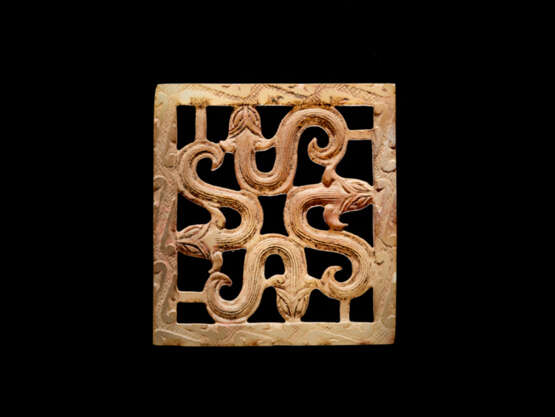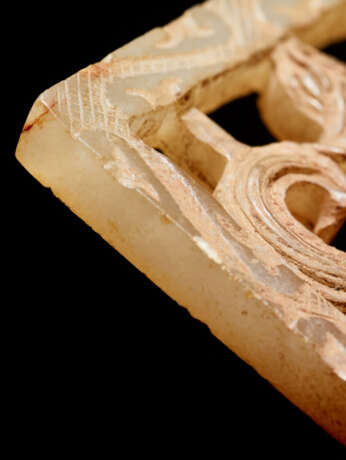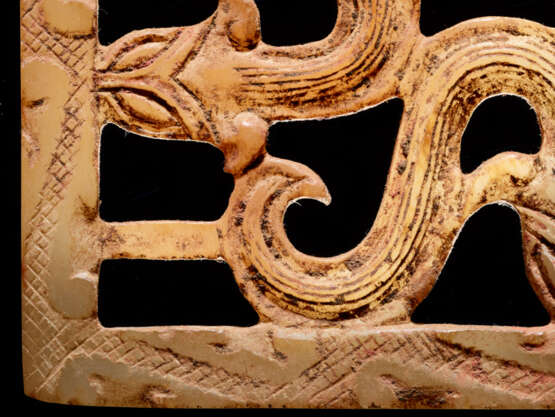ID 7371
Lot 33 | A SQUARE PLAQUE WITH AN OPENWORK PATTERN OF FOUR SNAKES
Valeur estimée
€ 4 000
鏤空四蛇紋玉佩- 東周時代, 公元前5世紀-前4世紀
WIDTH: 4.9 cm
寬 4.9 厘米
This small ornamental plaque is carved in openwork and slight relief, with a regular pattern of four similar, connecting snakes with undulating, s-shaped bodies, as seen from above. The snakes are comprised within a square frame that is decorated with back to back scrolls carved in low relief and etched areas in between. The underside of the plaque is totally flat and plain, suggesting that it was meant to be seen from one side only, and probably attached or sewn onto something else. The undulating body of each snake attaches to the one next to it, creating a curvy rectangular space in the centre. Their heads, detailed with long, slanting eyes and two pointed ear-like projections, ‘bite’ the frame of the ornament: the bodies are decorated with incised, parallel lines and terminate in a pointed, curled tail. Near the tail of each snake there is a short bar that connects the body to the frame which works as a strengthening element to avoid breakage of the delicate cut-out pattern.
The front side of the jade is more uniformly coloured, with a beige, but mostly brownish tint that has made the jade opaque, while the original ivory colour of the otherwise translucent stone is more visible on the plain back.
Literature comparison/Archaeological sites: The design, openwork technique and iconography are typical of jades that were crafted in southern China during the Warring States phase of the Eastern Zhou period, which have mostly been found in tombs of the southern Chu state and culture. However, similar small jade plaques decorated with snakes but not carved in openwork have also been discovered in the 4th century BC tombs of the kings of the northern Zhongshan state in Pingshan county, Hebei province, whose jades were strongly influenced by designs and motifs that originated in southern China. See, for example, an openwork ornament with four dragons carved around a central ring that was excavated in 1978 from the royal Zhongshan tombs and published in Yang Boda, Zhongguo meishu quanji: yuqi 中國美术全集 - 玉器 (Chinese works of art series: jade) vol.9, Beijing 1986, no.121.
One of the closest comparable examples is offered by a ring with an openwork decoration of snakes and dragon-like animals published in F. Salviati, 4000 Years of Chinese Archaic Jades, Edition Zacke, Vienna 2017, no.222: the ring is carved from a very similar material and the frame is decorated with the same motif of back to back scrolls. See also a rectangular plaque in openwork with intertwined snakes from the Samuel and Myrna Myers collection, published in J.P. Desroches (ed.), Two Americans in Paris. A Quest for Asian Art, Paris 2016, no.163. Similar snake-like animals are also carved on an openwork ornament in the Harvard Art Museums’ collections (accession number 1943.50.387) published in M. Loehr and L.G. Fitzgerald Huber, Ancient Chinese jades from the Grenville L. Winthrop collection in the Fogg Art Museum, Harvard University, Fogg Art Museum (Cambridge, MA) 1975, no.380. This jade belongs to the same group as no. 186 in F. Salviati, 4000 Years of Chinese Archaic Jades, Edition Zacke, Vienna 2017. Exactly same jade and design.
Expertise: Prof. Dr. Filippo Salviati
From an Austrian collection
奧地利老佔有
All jades in this catalogue have been professionally examined, authenticated and described by Prof. Fillipo Salviati. Professor Salviati teaches Chinese and Korean art at Sapienza University in Rome, in the Italian Institute of Oriental Studies. He is a world expert on archaic Chinese jades, having released multiple publications and being cited by renowned auction houses such as Sotheby’s.
| Adresse de l'enchère |
Galerie Zacke Mariahilferstrasse 112 1070 Wien Autriche | ||||||||||||||
|---|---|---|---|---|---|---|---|---|---|---|---|---|---|---|---|
| Aperçu |
| ||||||||||||||
| Téléphone | +00 4315-320 452 | ||||||||||||||
| Fax | +43-1-5320452-20 | ||||||||||||||
| Commission | 27.000 | ||||||||||||||
| Conditions d'utilisation | Conditions d'utilisation | ||||||||||||||
| Heures d'ouverture | Heures d'ouverture
|






